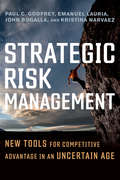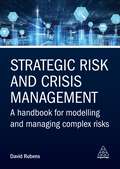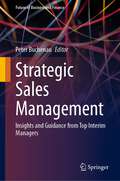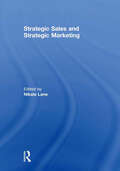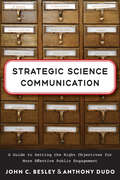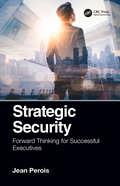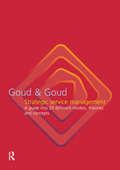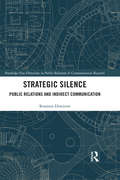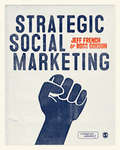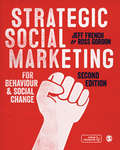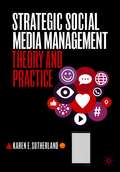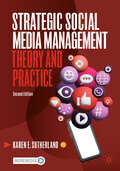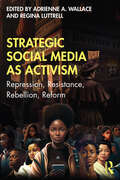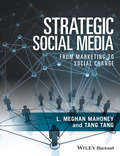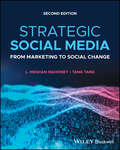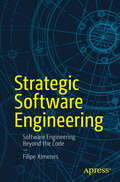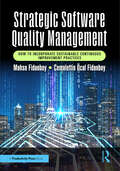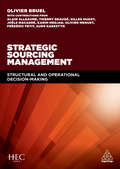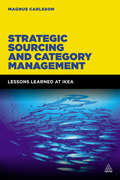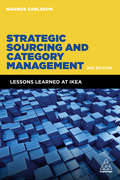- Table View
- List View
Strategic Risk Management: New Tools for Competitive Advantage in an Uncertain Age
by Paul C. Godfrey Kristina Narvaez Emanuel Lauria John BugallaThis book presents a new approach to risk management that enables executives to think systematically and strategically about future risks and deal proactively with threats to their competitive advantages in an ever more volatile, uncertain, complex, and ambiguous world.Organizations typically manage risks through traditional tools such as insurance and risk mitigation; some employ enterprise risk management, which looks at risk holistically throughout the organization. But these tools tend to focus organizational attention on past actions and compliance. Executives need to tackle risk head-on as an integral part of their strategic planning process, not by looking in the rearview mirror. Strategic Risk Management (SRM) is a forward-looking approach that helps teams anticipate events or exposures that fundamentally threaten or enhance a firm's position. The authors, experts in both business strategy and risk management, define strategic risks and show how they differ from operational risks. They offer a road map that describes architectural elements of SRM (knowledge, principles, structures, and tools) to show how leaders can integrate them to effectively design and implement a future-facing SRM program. SRM gives organizations a competitive advantage over those stuck in outdated risk management practices. For the first time, it enables them to look squarely out the front windshield.
Strategic Risk and Crisis Management: A Handbook for Modelling and Managing Complex Risks
by David RubensFrom natural disasters to cyber-attacks to global pandemics, the modern risk environment is highly complex and challenges our fundamental understanding of risk and crisis management. All senior risk and crisis managers face a similar challenge: maximizing their organization's ability to prepare for a potential high-impact event. Blending practical insights with rigorous research, Strategic Risk and Crisis Management provides a range of realistic solutions for any operational environment. It introduces concepts, frameworks and processes that will allow businesses to not only survive but respond and recover at a time of maximum chaos and confusion. Authored by a recognized global authority on the strategic management of complex events, the book covers the integration of multiple stakeholders and the importance of information exchange and critical decision-making under pressure at strategic, tactical and operational levels. It also includes material on leadership, sense-making, resilience, wicked problems and the challenges of global urban resilience, as well as case studies with detailed analysis of organizational failures and the lessons learned, including COVID-19, the WannaCry attack, the Texas snowstorm, and the Gatwick Airport Drone Incident. Strategic Risk and Crisis Management is an essential read for professionals working in security, risk, crisis management and emergency response. It will also be a valuable text for university students taking modules on security, risk, emergency response and crisis management.
Strategic Sales Management: A Boardroom Issue
by Adrian J. Slywotzky Benson P. Shapiro Stephen X. DoyleExplains why sales management has become an increasingly important and complex topic for top managers. Demonstrates the financial impact of a superior salesforce and then describes a way to gain superiority. The focus is on a salesforce that is responsive to customer needs and competing imperatives. Organization and management receive careful attention.
Strategic Sales Management: Insights and Guidance from Top Interim Managers (Future of Business and Finance)
by Peter BuchenauSales is a CEO's job, or at least it should be. But many entrepreneurs and managers come from other disciplines such as legal, production or product marketing – or they may have inherited the business. In most companies, a sales director is responsible for the operational management of the sales department. However, sales also need to be considered strategically, in terms of the business, the products or even the target market, for which many entrepreneurs or sales managers unfortunately lack the time or even the knowledge.In this book, experienced interim managers reveal the most important and necessary strategic methods and approaches to maintain and lead competitiveness for years to come. Readers will benefit from the first-hand insights of prominent and internationally experienced interim managers such as Ulvi Aydin, Uwe Brüggemann, Michael Eckardt, Ulrich Girrbach, Elmar Gorich, Ralf Komor, Peter Kuhle, Siegfried Lettmann, Thomas Mertens, Stephan Rohe, Rainer Simmoleit and Stefan Zeiss. Practitioners and MBA students in particular will benefit from these insights into what makes strategic sales management successful.
Strategic Sales and Strategic Marketing
by Nikala LaneThere is growing evidence that the traditional role of the sales organization in business-to-business marketing is quickly evolving from a tactical, operational function to a strategic capability concerned with the management of critical processes that support business strategy and deliver value to profitable customers. This topic is of major relevance to scholars in both the sales and marketing domains, and this relevance is underlined by the intense interest of managers and companies in how this field is changing. This collection is a unique gathering of views on the critical issues to be confronted in the strategizing of the sales function, from distinguished scholars from throughout the world. Their focus is on the linkages between strategic marketing and the corollary of strategic sales. This book was published as a special issue of Journal of Strategic Marketing.
Strategic Science Communication: A Guide to Setting the Right Objectives for More Effective Public Engagement
by Anthony Dudo John C. BesleyWhat tactics can effective science communicators use to reach a wide audience and achieve their goals?Effective science communication—the type that can drive behavior change while boosting the likelihood that people will turn to science when faced with challenges—is not simply a matter of utilizing social media or employing innovative tactics like nudges. Even more important for success is building long-term strategic paths to achieve well-articulated goals. Smart science communicators also want to create communication opportunities to improve their own thinking and behavior.In this guidebook, John C. Besley and Anthony Dudo encapsulate their practical expertise in 11 evidence-based principles of strategic science communication. Among other things, science communicators, they argue, should strive to seem competent, warm, honest, and willing to listen. Their work should also convey a desire to make the world a better place. Highlighting time-tested methods for building rapport with an audience through several modes of communication, Besley and Dudo explain how to achieve each strategic objective. All scientific communication is goal-oriented, and Besley and Dudo discuss the importance of recognizing the right goals, then employing strategic and tactical communication in order to achieve them. Finally, they offer specific suggestions for how practitioners can evaluate the effectiveness of their communications (and in fact, build evaluation into their plans from the beginning).Strategic Science Communication is the first book to use social science to help scientists and professional science communicators become more evidence-based. Besley and Dudo draw on insightful research into the science of science communication to provide readers with an opportunity to think more deeply about how to make communication choices. This guidebook is essential reading for all professionals in the field.
Strategic Security: Forward Thinking for Successful Executives
by Jean PeroisStrategic Security will help security managers, and those aspiring to the position, to think strategically about their job, the culture of their workplace, and the nature of security planning and implementation. Security professionals tend to focus on the immediate (the urgent) rather than the important and essential—too often serving as "firefighters" rather than strategists. This book will help professionals consider their roles, and structure their tasks through a strategic approach without neglecting their career objectives. Few security management books for professionals in the field focus on corporate or industrial security from a strategic perspective. Books on the market normally provide "recipes," methods or guidelines to develop, plans, policies or procedures. However, many do so without taking into account the personal element that is supposed to apply these methods. In this book, the authors helps readers to consider their own career development in parallel with establishing their organisation security programme. This is fundamental to becoming, and serving as, a quality, effective manager. The element of considering career objectives as part-and-parcel to this is both unique to only this book and vital for long-term career success. The author delineates what makes strategic thinking different in a corporate and security environment. While strategy is crucial in the running of a company, the traditional attitude towards security is that it has to fix issues quickly and at low cost. This is an attitude that no other department would tolerate, but because of its image, security departments sometimes have major issues with buy-in and from top-management. The book covers the necessary level of strategic thinking to put their ideas into practice. Once this is achieved, the strategic process is explained, including the need to build the different steps into this process—and into the overarching business goals of the organisation—will be demonstrated. The book provides numerous hand-on examples of how to formulate and execute the strategic master plan for the organization. The authors draws on his extensive experience and successes to serve as a valuable resource to all security professionals looking to advance their careers in the field.
Strategic Service Management: A Guide into 20 Different Models, Theories and Concepts
by Bettie M.J. Goud Aart P.J. GoudServices comprise about 70% of the BNP in most Western societies. Services surround us each and every day and include such sectors as medical, IT, financial, travel, telecommunication and educational. This book is about services and has been written for service managers and practitioners as well as students who aim to move into those areas. The book outlines the fundamental issues of service and service management - offering support by discussing some twenty different business administration models. Real-world examples from both non-profit and for-profit sectors are used throughout the book as well as "what to do" summaries. This text provides an excellent introduction to service management for students of marketing, economics, business administration, hospitality management and other courses.
Strategic Shakespeare: Transformative Leadership for the Future of Higher Education
by Marcela Kostihová Natalie K. Eschenbaum Ariane M. BalizetStrategic Shakespeare demonstrates the value of humanities-trained scholars as leaders in higher education. It features contributions from Renaissance and Shakespearean scholars in leadership roles in North American higher education, who collectively aim to leverage traditional assumptions about Shakespeare in the service of a more inclusive and sustainable academy.Making a powerful case for the liberal arts, the contributors demonstrate ways in which training in the humanities creates a baseline of skills in collaboration, deep listening, tolerance for ambiguity, and a range of positionalities. They also illustrate an astute understanding of disparate data sets, persuasive storytelling, and a commitment to liberal arts education. As this innovative collection showcases, these skills are crucial in the current climate, as higher education struggles with declining enrolments, decreasing budgets, growing public distrust, and (often) hostile legislative oversight. Additionally, the skills help us navigate a rapidly shifting landscape of learning in the aftermath of the COVID-19 pandemic and entry of generative artificial intelligence (AI) to the public sphere. The collection presents theoretical arguments, case studies, personal narratives, and practical advice related to how humanities-trained scholars have led and must continue to lead the academy through transformative change.Strategic Shakespeare is an essential tool for anyone interested in learning from university leaders who have made good things happen on their campuses, in their communities, and in the profession. It celebrates and foregrounds the core adaptive skills that humanities scholars bring to the table, showcasing their unique predisposition for successful academic leadership during a time of unprecedented change.
Strategic Shopper Marketing: Driving Shopper Conversion by Connecting the Route to Purchase with the Route to Market
by Georg August KrentzelStrategic Shopper Marketing provides a uniquely strategic perspective on the “anything, anywhere, anytime” retail revolution. Following the principles set out by leading global consultant Georg August Krentzel, a practitioner can connect shopper marketing principles with strategic concerns, aligning it with other disciplines like marketing, sales and distribution to connect their route to purchase with their route to market. Providing professionals with a theoretically well-founded understanding of shopper marketing, the book charts the history and development of shopper marketing and describes the newest developments and changes in the marketplace that impact how shoppers need to be activated to generate profitable sales and loyalty. The book presents a guideline with examples and numerous illustrations to develop successful shopper marketing strategies across different sales channels. Focused on practice, but with solid theoretical foundations, practical insights and methodologies, and enriched with examples, this book is ideal for marketing practitioners at strategic levels looking to integrate shopper marketing principles into their organization, as well as for those less experienced practitioners learning the principles, and those in marketing education.
Strategic Silence: Public Relations and Indirect Communication (Routledge New Directions in PR & Communication Research)
by Roumen DimitrovMainstream public relations overvalues noise, sound and voice in public communication. But how can we explain that while practitioners use silence on a daily basis, academics have widely remained quiet on the subject? Why is silence habitually famed as inherently bad and unethical? Silence is neither separate from nor the opposite of communication. The inclusion of silence on a par with speech and non-verbal means is a vital element of any communication strategy; it opens it up for a new, complex and more reflective understanding of strategic silence as indirect communication. Drawing on a number of disciplines that see in silence what public relations academics have not yet, this book reveals forms of silence to inform public relations solutions in practice and theory. How do we manage silence? How can strategic silence increase the capacity of public relations as a change agent? Using a format of multiple short chapters and practice examples, this is the first book that discusses the concept of strategic silence, and its consequences for PR theory and practice. Applying silence to communication cases and issues in global societies, it will be of interest to scholars and researchers in public relations, strategic communications and communication studies.
Strategic Social Marketing
by Jeff French Ross GordonLecturers/Instructors - Request a free digital inspection copy here. 'For anyone interested in great social marketing practice in the 21st century, and how it needs to adapt as our understanding of behaviour change evolves, this publication is chock full of good practice and smart strategy.’ Dan Metcalfe, Deputy Director - Marketing, Public Health England, UK Strategic Social Marketing takes a systemic approach to explaining and illustrating the added value of applying marketing to solve social problems. The authors present social marketing principles in a strategic, critical and reflexive way to help engender social good via the effectiveness and efficiency of social programmes in areas such as Health, Environment, Governance and Public Policy. In illustrating how it can be applied, the text places Strategic Social Marketing in a global context, giving examples and case studies from around the world. Set into a clear structure it: Takes you through an exploration of why marketing should be an integral component of all social programme design and delivery when looking to achieve social good Moves on to the nature and application of social marketing, rethinking traditional concepts such as ‘value’ and ‘exchange’ in the social context Lays out the ‘how to’ so you can create fully realised strategy, plans, frameworks and tactics to influence behaviours. Visit the Strategic Social Marketing Companion Website - Featuring free resources for marketing students and lecturers.
Strategic Social Marketing
by Jeff French Ross GordonLecturers/Instructors - Request a free digital inspection copy here. 'For anyone interested in great social marketing practice in the 21st century, and how it needs to adapt as our understanding of behaviour change evolves, this publication is chock full of good practice and smart strategy.' Dan Metcalfe, Deputy Director - Marketing, Public Health England, UK Strategic Social Marketing takes a systemic approach to explaining and illustrating the added value of applying marketing to solve social problems. The authors present social marketing principles in a strategic, critical and reflexive way to help engender social good via the effectiveness and efficiency of social programmes in areas such as Health, Environment, Governance and Public Policy. In illustrating how it can be applied, the text places Strategic Social Marketing in a global context, giving examples and case studies from around the world. Set into a clear structure it: Takes you through an exploration of why marketing should be an integral component of all social programme design and delivery when looking to achieve social good Moves on to the nature and application of social marketing, rethinking traditional concepts such as 'value' and 'exchange' in the social context Lays out the 'how to' so you can create fully realised strategy, plans, frameworks and tactics to influence behaviours. Visit the Strategic Social Marketing Companion Website - Featuring free resources for marketing students and lecturers.
Strategic Social Marketing: For Behaviour and Social Change
by Jeff French Ross GordonAdopting an international approach and offering a broader and contemporary perspective, this second edition of Strategic Social Marketing presents social marketing principles in a strategic, critical and reflexive way, illustrating the value of applying marketing to solve social problems, including: New ideas introducing core values and ways of thinking about behaviour and social change Integration of the latest concepts, research, and frameworks informing behaviour and social change efforts New vignettes and short case studies from leading thinkers in the field to illustrate concepts and ideas throughout the text The authors explore the reasons why social marketing should be an integral component of all social programme design and delivery when looking to achieve social good. They comprehensively explain the nature and application of social marketing; reconceptualising &‘value&’, &‘systems thinking&’, &‘the social marketing intervention mix&’, and &‘critical social marketing&’, in the social context. They then lay out strategy, plans, frameworks and tactics that policymakers, practitioners, students and indeed any social change agents can use to effect change for social good.
Strategic Social Marketing: For Behaviour and Social Change
by Jeff French Ross GordonAdopting an international approach and offering a broader and contemporary perspective, this second edition of Strategic Social Marketing presents social marketing principles in a strategic, critical and reflexive way, illustrating the value of applying marketing to solve social problems, including: New ideas introducing core values and ways of thinking about behaviour and social change Integration of the latest concepts, research, and frameworks informing behaviour and social change efforts New vignettes and short case studies from leading thinkers in the field to illustrate concepts and ideas throughout the text The authors explore the reasons why social marketing should be an integral component of all social programme design and delivery when looking to achieve social good. They comprehensively explain the nature and application of social marketing; reconceptualising &‘value&’, &‘systems thinking&’, &‘the social marketing intervention mix&’, and &‘critical social marketing&’, in the social context. They then lay out strategy, plans, frameworks and tactics that policymakers, practitioners, students and indeed any social change agents can use to effect change for social good.
Strategic Social Media Management: Theory and Practice
by Karen E. SutherlandThis textbook provides a lively introduction to the fast-paced and multi-faceted discipline of social media management with international examples and perspectives. Aside from focusing on practical application of marketing strategy, the textbook also takes students through the process of strategy development, ethical and accurate content curation, and strategy implementation, through detailed explanations of content creation.Combining theory and practice, Strategic Social Media Management teaches students how to take a strategic approach to social media from an organisational and business perspective, and how to measure results. Richly supported by robust and engaging pedagogy and cases in each chapter, it integrates perspectives from public relations, marketing and advertising, and examines key topics such as risk, ethics, privacy, consent, copyright issues, and crises management. It also provides dedicated coverage of content strategy and campaign planning and execution.Reflecting the demands of contemporary practice, advice on self-care for social media management is also offered, helping to protect people in this emerging profession from the negativity that they can experience online when managing an organisation’s social media presence. After reading this textbook, students will be able to develop a social media strategy, curate accurate and relevant content, and create engaging social media content that tells compelling stories, connects with target audiences and supports strategic goals and objectives.This is an ideal textbook for students studying social media strategy, marketing and management at undergraduate level. It will also be essential reading for marketing, public relations, advertising and communications professionals looking to hone their social media skills and strategies.
Strategic Social Media Management: Theory and Practice
by Karen E. SutherlandThis textbook provides a lively introduction to the fast-paced and multi-faceted discipline of social media management, with international perspectives, AI approaches and tools to enhance the learning experience. Aside from focusing on practical application, the textbook takes readers through the process of strategy development and implementation, ethical and accurate content curation, and strategic content creation.Combining theory and practice, Strategic Social Media Management teaches readers how to take a strategic approach to social media from organisational and business perspectives, and how to measure results. Richly supported by robust and engaging pedagogy and case studies, it integrates public relations, marketing and advertising perspectives, and examines key issues including risk, ethics, privacy, consent, copyright, and crisis management.Reflecting the demands of contemporary practice, advice on self-care is also provided, helping to protect emerging Social Media Managers from the negativity they can experience online. By the end, readers will be able to develop a social media strategy, understand accurate and relevant content curation, and create engaging social media content that tells compelling stories, connects with target audiences and supports strategic goals and objectives.This is an ideal textbook for students learning social media strategy, marketing and management at undergraduate level. It is also essential reading for business owners, marketing, public relations, advertising and communications professionals looking to hone their social media skills.The first edition of this textbook won a Book Excellence Award, a Silver International Stevie Award for Best Business Book and was named in the Best 100 Public Relations eBooks of All Time by the Book Authority.
Strategic Social Media as Activism: Repression, Resistance, Rebellion, Reform
by Adrienne A. Wallace and Regina LuttrellDrawing on a range of theoretical and empirical perspectives, this volume examines the roles strategic communications play in creating social media messaging campaigns designed to engage in digital activism. As social activism and engagement continue to rise, individuals have an opportunity to use their agency as creators and consumers to explore issues of identity, diversity, justice, and action through digital activism. This edited volume situates activism and social justice historically and draws parallels to the work of activists in today’s social movements such as modern-day feminism, Black Lives Matter, #MeToo, Missing Murdered Indigenous Women, and We Are All Khaled Said. Each chapter adds an additional filter of nuance, building a complete account of mounting issues through social media movements and at the same time scaffolding the complicated nature of digital collective action. The book will be a useful supplement to courses in public relations, journalism, social media, sociology, political science, diversity, digital activism, and mass communication at both the undergraduate and graduate level.
Strategic Social Media: From Marketing to Social Change
by Tang Tang L. Meghan MahoneyStrategic Social Media is the first textbook to go beyond the marketing plans and how-to guides, and provide an overview of the theories, action plans, and case studies necessary for teaching students and readers about utilizing social media to meet marketing goals. Explores the best marketing practices for reaching business goals, while also providing strategies that students/readers can apply to any past, present or future social media platform Provides comprehensive treatment of social media in five distinct sections: landscape, messages, marketing and business models, social change, and the future Emphasizes social responsibility and ethics, and how this relates to capitalizing on market share Highlights marketing strategies grounded in research that explains how practitioners can influence audience behaviour Each chapter introduces theory, practice, action plans, and case studies to teach students the power and positive possibilities that social media hold
Strategic Social Media: From Marketing to Social Change
by Tang Tang L. Meghan MahoneyLearn to utilize social media strategies that inspire behavior change in any landscape Strategic Social Media: From Marketing to Social Change, Second Edition combines best social media marketing practices with the application of traditional communication, behavior change, and marketing theories. More than a basic "how-to" guide, this innovative resource balances social media theory and real-world practice in a variety of areas, including advocacy, public health, entertainment, and education. With a clear and readable style, the authors explain the power and possibilities of social media to influence personal relationships and social change. The media environment of today is more mobile, visual, and personalized than ever before. In the second edition of Strategic Social Media, the authors incorporate advances in the field such as enhanced visual communication, digital experience sharing, omnichannel marketing, IoT, artificial intelligence, mass personalization, and social e-commerce. An entirely new chapter on utilizing social media for personal branding efforts is accompanied by new and updated examples, action plans, business models, and international case studies throughout. Covers all key aspects of strategic social media: landscape, messages, marketing and business models, social change, and the future Highlights opportunities to break down barriers with institutions of power, achieve greater transparency, and mobilize users through social media Contains social media strategies readers can apply to any past, present, or future social media platform Helps practitioners make better decisions about brand objectives and evaluate and monitor social media marketing efforts Provides clear guidance on crafting social media messages that reach intended audiences and ignite dialogue and behavior change Offering comprehensive coverage of both the theory and practice of facilitating behavior change in social media audiences, Strategic Social Media: From Marketing to Social Change, Second Edition, is essential reading for undergraduate and graduate students in digital and social media marketing courses, social media practitioners, entrepreneurs, digital content creators, journalists, activists, and marketing and public relations professionals.
Strategic Software Engineering: Software Engineering Beyond the Code
by Filipe XimenesThe role of a software engineer goes well beyond writing code. In many companies, large or small, engineers often need to understand unfamiliar business rules, and then coordinate with multiple groups to ship software within a tight schedule. Although the skills required to perform this job effectively can be hidden within one's years of experience, learning from mistakes, peer guidance, and available resources, are critical to success. This book summarizes the skills and practices effective engineers should leverage to excel at their job. A chapter is dedicated to each of the four main pillars that form a successful engineering career: Self-Management, Technical Discipline, Risk Management, and Strategic Teamwork. Topics covered within each pillar include insights and tips on how to enhance your career simply by making small changes in the way you work. Based on a collection of mentorship sessions from author Filipe Ximenes, Strategic Software Engineering will empower you to maximize the impact of your work. What You Will Learn Master skills beyond writing code to achieve career goals. Make your day-to day work more impactful through meaningful changes. Identify, mitigate, and manage risk. Leverage teamwork and collaboration to build successful products. Who This Book Is For Mid-level engineers looking to make the jump to senior roles, as well as experienced engineers and managers who are looking to bolster their careers
Strategic Software Quality Management: How to Incorporate Sustainable Continuous Improvement Practices
by Mahsa Fidanboy Cemalettin Öcal FidanboyThis book introduces strategic management tools and techniques appropriate for use in software quality management. There has been a gap between strategic management and software quality, and the solutions for solving the problems and improving the software quality usually come from the experience of IT experts: the managerial experience. This book helps people interested in software quality to go beyond the IT technical issues and integrate strategic management tools with their technical knowledge to become more prepared for the future, develop long-term plans for solutions and improvements, take more strategic decisions even when compared with the competitors, and finally, reach sustainable continuous improvements.This book, by bridging software quality management and strategic management, can be used by software quality practitioners for effective results. The software development process is usually studied with regards to its functional aspects and the attempts to improve the quality and performance are mainly concentrated on the technical side. The developers, testers, or engineers search for solutions mostly directed toward a local problem specific to a unit, department, or code. What is often missing is grasping the big image of the problem: the managerial aspect. Even if all the technical staff are doing their tasks as they were planned, there is a vital need for identifying the bottlenecks and the points in need of improvements, alterations, and exclusions, together with tracking the progress and coming up with future strategies. This makes the software quality management activities intertwined with the strategic management concepts where strategic management enhances the quality management with its tools and techniques, and, in return, the software quality management provides the strategic management with insights on the technical issues, resulting in symbiosis. The highly competitive nature of the IT world makes it inevitable to take strategic tools and techniques into account and infuse them into the technical practices of software quality management.This book encompasses the following chapters: analyzing the current situation, identifying the improvement areas, determining the strategies, tracking the progress, and achieving a sustainable improvement.
Strategic Sourcing Management: Structural and Operational Decision-making
by Professor Olivier BruelStrategic Sourcing Management examines procurement and supply management in detail, covering the three dimensions of competitiveness, effectiveness and efficiency. Written by Olivier Bruel, Professor Emeritus HEC Paris, and a team of contributing experts from academia, consulting and industry, the book is organised into four parts: strategic decisions; operational management of procurement and related supply chain; management of human resources and dedicated information systems; management of performance and change. This book has been written with a comprehensive global and coherent approach but the chapters are self-standing, enabling the reader to dip into different sections according to need. Strategic Sourcing Management considers both tactical and strategic perspectives that link with a corporate strategy and it includes dedicated chapters on how to set up a Strategic Sourcing function. The text is enriched with clear graphics and solid examples of best practice. Strategic Sourcing Management is a robust text based on both research and experience, so an essential reference for practitioners and academics working in or studying procurement and supply management. It is suitable for anyone involved in procurement and supply management at a senior level but also for general management enabling them to understand the mechanisms of value creation through Strategic Sourcing.
Strategic Sourcing and Category Management
by Magnus CarlssonLegendary for its purchasing strategies, IKEA revolutionised the thinking and execution of procurement departments across the world. Are you ready to learn the secrets of success of one of the most admired purchasing organizations in the world? Strategic Sourcing and Category Management examines how category management works in practice, drawing insight from IKEA. With over twenty years' experience of purchasing at IKEA, Magnus Carlsson shares the wisdom gained from devising and executing IKEA's highly successful purchasing strategies. This unique text is not just a case study - it is supported by insightful interviews, case studies and practical examples, which are compared and contrasted with examples from other leading companies. Strategic Sourcing and Category Management answers three critical questions: -When is category management a profitable method and why? -How do category teams create real results? -How can category management be organized and implemented effectively? In answering these three questions, Magnus Carlsson not only presents the guiding principles behind category based sourcing, he also demonstrates how category based sourcing can effectively be implemented in practice and provides guidance on how to realise the benefits of this approach. Cleverly connecting theory and practice, the book draws upon both existing and new tools, and applies them in a highly practical context. With application spanning far beyond IKEA, this book is an invaluable resource for procurement and purchasing professionals in any industry. Strategic Sourcing and Category Management is the result of twenty five years' experience of Strategic Sourcing within IKEA and collaboration with several companies and the Stockholm School of Economics.
Strategic Sourcing and Category Management: Lessons Learned at IKEA
by Magnus CarlssonHow is it possible to sell a kitchen at 30 per cent below market price? Why are hot dogs cheaper in IKEA than in the supermarket? How can IKEA sell the Lack table at half the price it was when it was launched 35 years ago and how can it be achieved with a substantial profit? Strategic Sourcing and Category Management examines how IKEA - and other cost leading companies - use category management to create advantages with direct and indirect sourcing. With 25 years' experience from IKEA, where he had the responsibility to develop and execute the company's purchasing strategy, author Magnus Carlsson shares his insights on important topics: when category management is profitable and why; how teams repeatedly create value and results; what the main approaches are in different categories; how a company implements category management; the difference between success and failure.In this new edition of Strategic Sourcing and Category Management, Magnus Carlsson has added new themes including examples and references from companies such as Maersk, Carlsberg, P&G and Aldi, illustrating the application of cost leadership that spans far beyond IKEA. Even in IKEA, the cost leadership lessons are not limited to home furnishings as the company is sourcing categories such as food, components, materials, transports and indirect materials, with a total purchasing spend of approx. €7 billion. However, maybe even more importantly, the book illustrates how teams create value by thinking differently and asking the right questions, allowing an understanding that goes beyond mere tools and processes.
